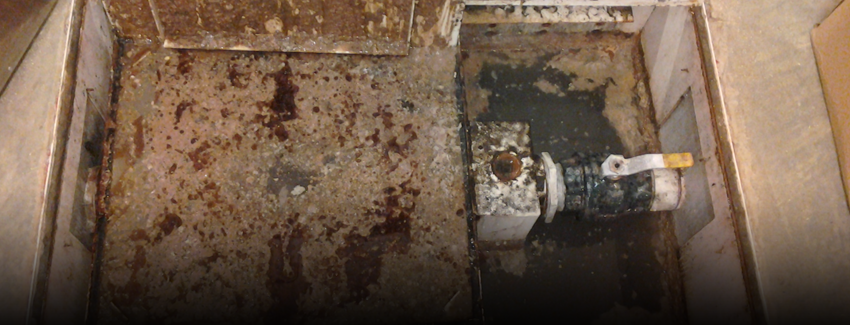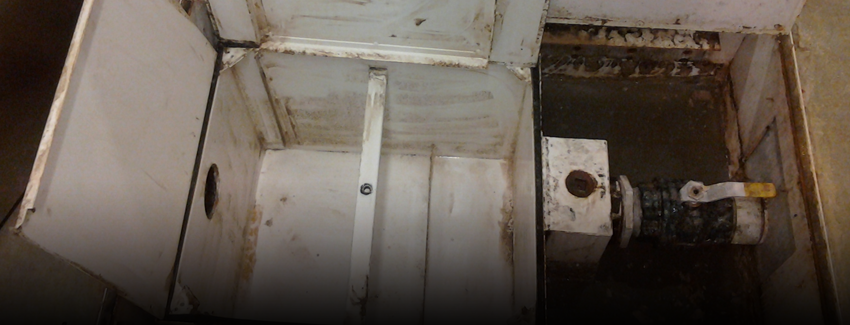A grease trap, or sometimes referred to as a grease interceptor, serves merely as a collection point for FOG (Fat, Oil, and Grease) that is generated daily from your establishment and preventing such materials from entering the municipal wastewater sewer system. Most commonly, the grease trap is located outside. It is a pre-cast structure that can even be placed in traffic areas to maximize space and provide an easier access for Johnson Environmental to service.
FOG creates all kind of challenges for municipal wastewater systems, which is why local governments require all commercial kitchens to have a grease trap installed. In addition, enforcement by municipalities is on the upswing, with many municipalities setting the required frequency and manifesting of your Grease Trap. This requires complete and accurate record keeping and compliance. That is where Johnson Environmental Services, with over 80 years of service in South Florida becomes your ally in fighting FOG. With a service contract from Johnson Environmental Services you can rest assured that.
Grease traps slow down the flow of water coming from drains, allowing the water / grease time to cool. This cooling causes the grease to coagulate and float to the top, while other, heavier solids, fall to the bottom of the trap. The remaining water is free to pass through on to the city sewer lines.


It is important to clean your grease trap/interceptor regularly to prevent fats, oil and grease (FOG) from mixing with water that is discharged to the sewer. The minimum cleaning frequency required for grease traps/interceptors in food service facilities may be dictated by the municipality or county that your business is located in, many require a service every 90 days. However, more frequent cleaning intervals may be necessary to prevent your grease trap/interceptor from operating poorly or improperly. FOG can have a detrimental impact not only on your facility, but the environment as well. FOG- clogged lines can back sewage up into your establishment and overflow out of manholes in parking lots and streets. If you see floating grease or grease deposits in a cleanout "downstream" of your trap/interceptor, you need to increase the cleaning frequency and initiate a more regular schedule.
Reason: People are more willing to support an effort if they understand the basis for it.
Benefit: All of the subsequent benefits of BMPs will have a better chance of being implemented.
Reason: Signs serve as a constant reminder for staff working in kitchens.
Benefit: This will help minimize grease discharge to traps/interceptors and reduce the cost of cleaning and disposal.
Reason: By dry-wiping and disposing in the garbage, the material will not be sent to grease traps.
Benefit: This will reduce the amount of material collected in the grease trap and interceptors, and will lessen cleaning and maintenance costs.
Reason: To divert food wastes away from grease traps and interceptors.
Benefit: Recycling or solid waste disposal will reduce the frequency and cost of grease trap and interceptor cleaning.
Reason: Cooking oil that ends up in grease traps will have to be pumped, costing businesses money.
Benefit: Johnson Bio-Fuels may pay to haul used cooking oil and make it into new products.
Reason: Rainwater into open containers can cause an overflow onto the ground leading to Stormwater collection systems, Retention Ponds and Waterways.
Benefit: Avoidance of polluting.
Reason: If grease and oil escape through the kitchen exhaust system, it can accumulate on exterior surfaces, eventually entering the storm drain system when it rains.
Benefit: Minimizes the chance of grease-related fires and the likelihood of grease entering nearby water bodies.
Reason: Grease poured into a toilet or sink can congeal, clogging sewer pipes and cause backups.
Benefit: Lower plumbing bills and no loss of business due to sewer backups.
Reason: Garbage disposals grind large food particles into small pieces. These pieces can fill up a grease trap causing backups or may require more frequent pump outs of the grease trap.
Benefit: No sewer backups and less money spent cleaning out the grease trap.
Reason: The three-sink system uses water less than 140°F, whereas a mechanical dishwasher requires a minimum temperature of 160°F.
Benefit: The facility will reduce energy costs for heating the water and operating the dishwasher.
© Copyright 2025. All Rights Reserved.